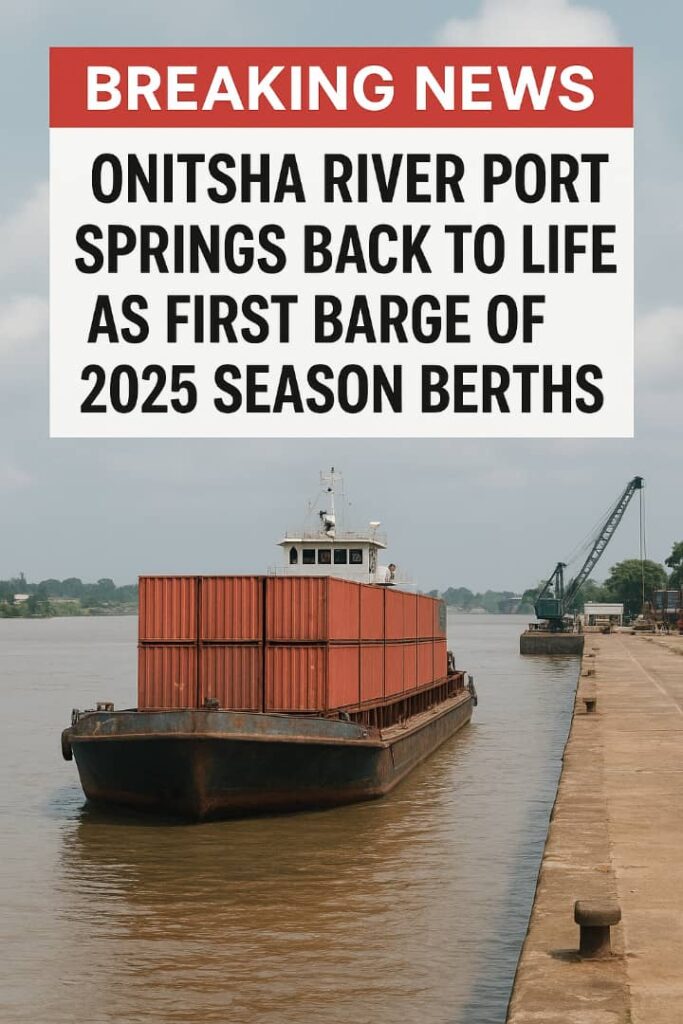
Breaking News: Onitsha River Port Springs Back to Life as First Barge of 2025 Season Berths
Onitsha, Anambra State — Thursday, August 21, 2025 (DocuNews Central) –
The long-dormant Onitsha River Port came alive this week as it welcomed its first barge of the 2025 navigation season, sparking renewed optimism among traders, transporters, and maritime stakeholders in Nigeria’s Southeast.
The barge, identified as MV ZUPITOR/MV RB ALASKA, berthed on Monday, August 4, 2025, carrying a consignment of ceramic tiles from Ajaokuta in Kogi State. The symbolic arrival was met with jubilation, signaling not just the beginning of seasonal operations but also reigniting conversations about the long-term economic potential of the port.
Historic Day for Onitsha
For a city known as one of West Africa’s busiest commercial hubs, the sight of barges sailing into Onitsha was both emotional and symbolic. Residents gathered along the banks of the River Niger to watch the arrival, while stakeholders in the maritime and logistics sector expressed relief that, once again, the port was open for business.
“Today is a landmark moment,” declared Mr. Chris Mbonu, General Manager of Universal Elysium Limited, the concessionaire managing Onitsha River Port. “The arrival of this barge underscores the economic promise of inland water transportation in Nigeria. But for this port to operate year-round, we need sustained dredging and government support.”
Why This Matters for the Southeast
The Southeast of Nigeria, dominated by bustling markets such as Onitsha Main Market, Ogbete Market (Enugu), Ariaria Market (Aba), and Nnewi’s industrial clusters, has long struggled with high transportation costs. Most goods are hauled by road from Lagos ports, a journey often marred by gridlock, bad roads, and multiple checkpoints.
The revival of the Onitsha River Port provides an alternative route. Stakeholders say it could slash transport costs by 30% to 40%, making goods cheaper for both traders and final consumers.
“This is more than a port; it is a gateway to economic survival for millions of traders in the Southeast,” said Chief Emmanuel Okeke, a trader in building materials. “If the government sustains this, we won’t need to spend millions trucking goods all the way from Lagos.”
Seasonal Promise, Persistent Challenges
While the port’s revival is celebrated, experts caution that its operations remain largely seasonal. The River Niger, which links the port to Warri and Lagos, becomes navigable only during the rainy season. Without regular dredging and channel maintenance, barges struggle to sail during the dry months.
Port Manager, Mr. Martins Osazuwa, confirmed this challenge:
“The port is ready and has the facilities, but we are at the mercy of nature. Without dredging, this will remain a seasonal event rather than a permanent solution. Government incentives are also needed to encourage private shippers to make use of the facility.”
The Bigger Picture: Economic and Social Impact
The arrival of the first barge is already igniting discussions about how the port can change the landscape of commerce in Nigeria. Analysts at DocuNews Central identify several key impacts:
- Reduced Road Traffic & Accidents: Fewer heavy trucks on Nigerian highways could help reduce frequent crashes, particularly along the Lagos–Benin–Onitsha expressway.
- Boost to Regional Trade: Traders in Onitsha, Aba, Enugu, Nnewi, Owerri, and Awka will gain easier access to imported goods and raw materials.
- Job Creation: More barge operations mean employment for dockworkers, transporters, and local businesses around the port.
- Decongestion of Lagos Ports: With inland ports like Onitsha active, Lagos ports may experience reduced pressure.
- Cheaper Goods: Lower transportation costs mean reduced prices of goods, benefiting millions of consumers across Nigeria.
Stakeholder Reactions
Premium Times Nigeria reported widespread jubilation as locals watched the historic barge arrival.
Legit.ng highlighted renewed hope among Southeast traders, who see the development as a step toward cheaper imports and a more vibrant regional economy.
The Sun Nigeria described the event as a “buzz of life” returning to Onitsha, underscoring the need for permanent solutions.
Apex News Exclusive also quoted stakeholders urging the Federal Government to prioritize year-round dredging of the River Niger to prevent interruptions to operations.
Calls for Action
The arrival of MV ZUPITOR/MV RB ALASKA is a milestone, but industry leaders stress that Nigeria must not let this momentum fade. Maritime unions, business associations, and economic experts are calling for:
Continuous dredging of the River Niger to allow all-year navigation.
Government incentives such as tax breaks for private shipping companies willing to use inland ports.
Improved security along river routes to encourage more operators to invest in barge transport.
Public–private partnerships to expand infrastructure at the port and create more logistics chains.
The Human Angle
For everyday traders, the news is more than just statistics. Chinwe Nwafor, who sells electrical goods at Onitsha Main Market, put it simply:
“Every year we pray for the port to open. Road transport is killing us. If this continues, it will change our lives. We can compete better, sell cheaper, and feed our families.”
Conclusion
The Onitsha River Port’s reawakening is both a celebration and a challenge. It symbolizes hope for Nigeria’s Southeast, a region whose entrepreneurial spirit has kept its economy alive despite decades of infrastructural neglect.
But unless the Federal Government and stakeholders address the dredging problem, insecurity, and policy gaps, the port risks remaining a seasonal symbol rather than a permanent solution.
For now, however, the people of Onitsha and beyond are celebrating the sight of a barge gliding across the River Niger — a reminder that with the right political will, Nigeria’s economic fortunes can still be transformed.
DocuNews Central will continue to monitor developments at the Onitsha River Port and provide updates on how this revival affects commerce, transportation, and the everyday lives of Nigerians.








